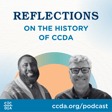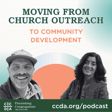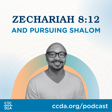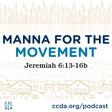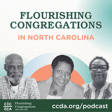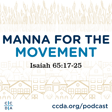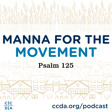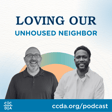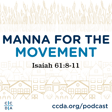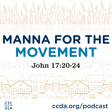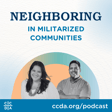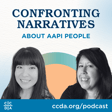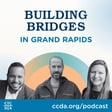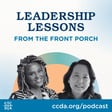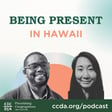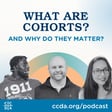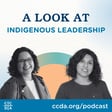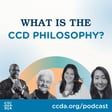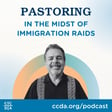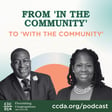Become a Creator today!Start creating today - Share your story with the world!
Start for free
00:00:00
00:00:01

Equity in Education and the Church
Dr. Lorenzo A. Watson is joined by Natarsha Sanders to discuss education equity. They reflect on the state of education today, why equity in education is important, and how we can make our communities more equitable.
Learn more about CCDA’s Education Equity Network, #TransformED, at ccda.org/transformed.
Natarsha Prince Sanders is a career educator with over 15 years of professional experience both inside and outside of the classroom. She earned a B.A. in Philosophy and History from Hollins University and a M.A. in Special Education from North Carolina Central University. She is currently completing her doctoral degree at Columbia Theological Seminary.
Connect with CCDA on Instagram, Twitter, Facebook, and LinkedIn. Follow CCDA on YouTube.
Recommended
Transcript
Introduction and Technical Hiccups
00:00:00
Speaker
Oh, you hit the button.
00:00:03
Speaker
I was looking at a completely different tab.
00:00:08
Speaker
Buddy, I need you to focus.
00:00:10
Speaker
I am focused.
00:00:12
Speaker
You just on the other side of the screen.
00:00:13
Speaker
Not if you're looking in a whole other tab.
00:00:16
Speaker
Look in the right tab.
00:00:18
Speaker
Okay, let me see if I can find the tab.
Introducing Natasha Sanders and Podcast Theme
00:00:29
Speaker
Hello and welcome to the CCDA Podcast.
00:00:32
Speaker
My name is Lorenzo Watson and I am the CEO of CCDA.
00:00:37
Speaker
And I'm your host for today's episode.
00:00:39
Speaker
And I am extremely excited about today's guest.
00:00:43
Speaker
In fact, I'm so excited about today's guest that I actually married her 21 years ago.
00:00:49
Speaker
That's right.
00:00:54
Speaker
Yep.
00:00:55
Speaker
Yep.
00:00:55
Speaker
So it's good to always talk to Miss Natasha Sanders.
00:01:00
Speaker
I call her Liberty.
00:01:01
Speaker
So for the rest of the episode, I'm going to say Liberty.
00:01:05
Speaker
I won't say Natasha anymore.
00:01:07
Speaker
So hi, Liberty.
00:01:08
Speaker
How are you?
00:01:09
Speaker
Hey, buddy, I'm doing good.
00:01:11
Speaker
And I call you Buddy.
00:01:13
Speaker
So welcome to the Liberty and Buddy show.
00:01:19
Speaker
Yes, yes.
00:01:20
Speaker
This is our opportunity to allow our worlds to collide and to talk about something that we're both passionate about and also something that feels extremely relevant to what's happening in the world today.
00:01:32
Speaker
So thank you for sharing a little bit of your time with CCDA and with me.
00:01:37
Speaker
I appreciate it.
00:01:38
Speaker
You're very welcome.
00:01:39
Speaker
You're very welcome.
00:01:40
Speaker
It's a pleasure and honor to be able to go to work with you today.
00:01:44
Speaker
You're coming to work with me?
00:01:47
Speaker
Yes.
00:01:48
Speaker
It's take your wife to work day.
00:01:51
Speaker
I like it.
00:01:52
Speaker
I like it.
00:01:53
Speaker
So I'm excited to be with Liberty today.
00:01:56
Speaker
I know a bunch about her and I have years of experience of living with this amazing woman.
00:02:02
Speaker
But I do want to pause and give her a moment just to tell you who she is professionally and spiritually so that you can probably get as excited as I am to have this conversation.
00:02:12
Speaker
Thank you so much, buddy.
00:02:14
Speaker
Yes, you do know me very well.
00:02:16
Speaker
And you've seen most of my educational journey.
Natasha's Educational Journey and Experience
00:02:20
Speaker
I was educated in the public school system of U.S.
00:02:25
Speaker
And I go back that far because I think it's important context for the conversation that we're going to have.
00:02:32
Speaker
But, you know, I went to college at Hollins University in Roanoke, Virginia, got my undergrad.
00:02:39
Speaker
What was the mascot?
00:02:40
Speaker
Don't start.
00:02:42
Speaker
Don't ask me about mascots, okay?
00:02:44
Speaker
Just rock the green and gold.
00:02:46
Speaker
That's all you need to do.
00:02:47
Speaker
I went on to get my master's degree in special education from North Carolina Central University.
00:02:53
Speaker
Eagles.
00:02:54
Speaker
Yeah.
00:02:55
Speaker
That is when I really decided that teaching was a gift that I had that I wanted to be able to give to the world.
00:03:02
Speaker
So I worked in public education in North Carolina,
00:03:07
Speaker
For a long time, like most of my career in education was spent in the public school systems of North Carolina.
00:03:16
Speaker
And so I've been in the classroom as a teacher assistant.
00:03:21
Speaker
I've been in the classroom as a lead teacher, as a one-on-one paraprofessional.
00:03:27
Speaker
I've worked in behavior services and I've worked with
00:03:34
Speaker
students on the autism spectrum and their families.
00:03:38
Speaker
And I've also worked with elementary school students with all sorts of special needs and provided education for the general population is what we would call it, and neurotypical learners in high school and middle school as well.
00:03:55
Speaker
So I've done some of everything educationally.
Equity vs. Equality in Education
00:04:00
Speaker
I also have to say that
00:04:02
Speaker
Because I love teaching, I also love learning.
00:04:04
Speaker
So like Sir President Dr. Lorenzo A. Watson, I will soon be Dr. Natasha Sanders as I am earning my doctoral degree as well.
00:04:19
Speaker
So there's that.
00:04:22
Speaker
Yes, there is that.
00:04:24
Speaker
Yes, I'm ready for that day to be able to celebrate with you.
00:04:27
Speaker
Yes.
00:04:28
Speaker
You and me both.
00:04:29
Speaker
We're going to be smiling so hard.
00:04:32
Speaker
So hard.
00:04:33
Speaker
You've already put in so much work with that.
00:04:36
Speaker
It's exciting.
00:04:37
Speaker
Well, thank you for sharing that.
00:04:39
Speaker
I can imagine, and I mean, like I've already said, I know just from our conversations over the years that you have seen varying levels of equity within the education space, right?
00:04:53
Speaker
You know, you've worked from, like you said, you know, being a teacher's assistant all the way to working at the central office, and you've worked with families and in the community.
00:05:03
Speaker
And so throughout all of
00:05:05
Speaker
all of those experiences, I would imagine that there are times where you've been angered because of what you've seen.
00:05:12
Speaker
You've also been filled with joy because of the things that you've experienced and been able to help create.
00:05:19
Speaker
And so let's take a moment just to kind of talk about
00:05:23
Speaker
what actually is education equity, right?
00:05:26
Speaker
As you look back over that landscape, how have you landed in terms of thinking about equity?
00:05:33
Speaker
And we can sort of lay as some groundwork the differentiation between equity and equality, right?
00:05:39
Speaker
So equality means that, you know, meaning everybody gets the same thing, the same set of resources, the same opportunities, and then equity being equity,
00:05:49
Speaker
the opportunity to match resources to specific needs for whatever reason those needs may have come about.
00:05:57
Speaker
But yeah, talk to us about some of the things that you've seen and share what education equity means to you.
00:06:05
Speaker
Absolutely.
00:06:07
Speaker
I like the fact that you said, I'm sure you've been angry.
00:06:11
Speaker
Yeah.
00:06:12
Speaker
You've seen me be angry.
00:06:13
Speaker
Yeah.
00:06:14
Speaker
Yeah, I was trying to set you up.
00:06:18
Speaker
You have had a front row seat of me and getting dismissed from meetings because I was so angry.
00:06:29
Speaker
I will say part of what led me to focus my career in special education, primarily behavioral modification, is because I saw...
00:06:42
Speaker
deeply, deeply the inequity that existed for people who really needed some behavioral support within the public education setting.
00:06:54
Speaker
So when we think about inequity, a lot of times when I was learning in class with my fellow colleagues, we would talk about how
00:07:05
Speaker
People of color in the public education system are always at the bottom.
00:07:10
Speaker
But when you put at that intersection, you are a person of color and you have a special need.
00:07:18
Speaker
Yes.
00:07:19
Speaker
That puts you even lower.
00:07:21
Speaker
And so we think about inequity.
00:07:25
Speaker
It is always at the forefront of my mind that someone with special needs is
00:07:33
Speaker
getting exactly what they need so they can have an appropriate education.
00:07:40
Speaker
And part of the reason I used to get angry a lot is because the students that I felt called to serve were not getting what they needed just to learn.
00:07:53
Speaker
I mean, we talk about free, appropriate public education, and that is called FAPE.
00:08:00
Speaker
And a lot of these things, we get upset about what's happening today when you hear people in Congress talk about how we are just systematically dismantling, if you will,
00:08:11
Speaker
The Constitution.
00:08:13
Speaker
Yes.
00:08:13
Speaker
It's because these acts for education are so young that they really we really haven't even had time to, like, put its roots in the ground.
00:08:26
Speaker
So the free, appropriate public education is grounded or, you know, in the 14th Amendment.
00:08:32
Speaker
Yeah.
00:08:33
Speaker
And the fact that we are looking at that particular thing and we know that its origin is so people who do have special learning needs can get an appropriate education.
00:08:46
Speaker
It was very like the 1970s.
00:08:50
Speaker
When the nation, the federal government decided, oh, yeah, we should make sure that people who have special learning needs get what they need in the public education system.
00:09:02
Speaker
And now we're looking at, OK, maybe not.
00:09:05
Speaker
You know, it's OK to say that they don't need or get what they need.
00:09:10
Speaker
And so my fight for my advocacy for people with special needs in public education is just rooted in the fact that everybody really can learn.
00:09:23
Speaker
Yes.
00:09:24
Speaker
And everybody really does deserve that.
00:09:28
Speaker
an appropriate education.
00:09:30
Speaker
And if we're giving an appropriate education to one person, then equity says that we should give a free and appropriate education to another person, no matter what their needs are.
00:09:46
Speaker
And so that's what equity is, making sure that everyone has a free
00:09:51
Speaker
appropriate public education.
00:09:55
Speaker
It took a law for us to get there as a nation.
00:09:59
Speaker
And now those who fought for it, who are still alive in many cases, are watching it being dismantled.
00:10:06
Speaker
And that hurts on so many levels.
00:10:08
Speaker
Yeah,
Inclusion in Community and Church Spaces
00:10:09
Speaker
it does.
00:10:09
Speaker
And I'm thankful that you identified this particular population, right?
00:10:13
Speaker
So students with special needs, because even within the church space, that's a population that's often ignored.
00:10:21
Speaker
And so I know you've done some work here as well, and I'd love to dialogue a little bit about
00:10:27
Speaker
how we can challenge ourselves even as CCD practitioners, right?
00:10:31
Speaker
Because we are extremely passionate and active around changing the public and societal landscape to be more aligned with education equity practices, right?
00:10:43
Speaker
Like we're certainly doing that.
00:10:46
Speaker
But oftentimes, if you look at our own churches, you will find still some of the same remnants of
00:10:53
Speaker
and behaviors and practices that marginalize people within our spaces, right?
00:10:59
Speaker
We have to ask ourselves, you know, what are we doing in our Sunday school classes that make space for individuals with special needs?
00:11:07
Speaker
Our Bible studies, how are we making those things accessible?
00:11:12
Speaker
and very practical despite the varying abilities people bring into the spiritual space, right, our worship spaces.
00:11:21
Speaker
So talk a little bit about that.
00:11:23
Speaker
How can we as practitioners not only
00:11:27
Speaker
continue to fight for this within this public discourse, but how do we then adopt some of those same practices within our faith institutions and worshiping communities so that we can have a more full experience of the beauty of God?
00:11:43
Speaker
Come on.
00:11:44
Speaker
There's a tenant that we talked about in grad school.
00:11:50
Speaker
And my advisor was so adamant that in all of our meetings about the students that we're serving,
00:11:59
Speaker
They need to be there in some capacity, whether they write what they want to say or they show up physically.
00:12:06
Speaker
So nothing about us without us.
00:12:09
Speaker
And there also is no one size fits all.
00:12:11
Speaker
That's why in special education, we have something called individualized education plans or IEP.
00:12:21
Speaker
So I would say for any church or any community community,
00:12:27
Speaker
any neighborhood that is really trying to figure out how to engage everyone
00:12:35
Speaker
that you have a conversation with everyone or with those that you are trying to engage because there is no one size fits all.
00:12:46
Speaker
And it is really hard to offer a remedy for a community or a church that I don't belong to or that I'm not a part of.
00:12:58
Speaker
What I do know and what I have seen across the board is that
00:13:03
Speaker
People love being able to talk and tell you about what they need and want.
00:13:10
Speaker
And so if you just start this, start with who is there and start with what you have.
00:13:18
Speaker
Right.
00:13:19
Speaker
You don't you really don't have to try to solve or.
00:13:24
Speaker
offer solutions for concerns or issues that don't exist for you when you're starting out, right?
00:13:31
Speaker
So in your immediate space.
00:13:34
Speaker
I will say if you're just starting out, survey your landscape.
00:13:39
Speaker
Look at who is there and work toward making sure everyone who shows up on a Sunday or Wednesday or whenever you have your open church or whenever you have church outings or whatever the case may be, make sure that everyone who wants to be there can be there.
00:13:58
Speaker
Yes.
00:13:58
Speaker
And that the accommodations that you have made for everyone makes it equitable for everyone.
00:14:06
Speaker
Yes, yes.
00:14:07
Speaker
I mean, that's so good.
00:14:09
Speaker
You know, I mean, you remind us that just because things are invisible to us doesn't mean that they are non-existent.
00:14:17
Speaker
Absolutely.
00:14:17
Speaker
There are so many things happening in the world that we might not see because of our privilege and positionality, but they are very real and need to be addressed.
00:14:29
Speaker
Right.
00:14:29
Speaker
Yeah, there's this one example that I bring up sometimes because it does get to your point about not being able to see things.
00:14:39
Speaker
One of my students really, really enjoyed the singing that would happen in his church that his family was attending.
00:14:49
Speaker
Yeah.
00:14:50
Speaker
Well, one Sunday he was not feeling well.
00:14:53
Speaker
And so he wasn't able to go to church.
00:14:56
Speaker
And that Sunday turned into another Sunday.
00:15:00
Speaker
And it just it just got so he kind of he stopped going to church altogether.
00:15:05
Speaker
And when they tried to get him to go back, he he was he didn't want to go.
00:15:10
Speaker
They would get.
00:15:12
Speaker
to the church parking lot.
00:15:13
Speaker
He would seem excited, but it was time to get out of the car.
00:15:16
Speaker
He didn't want to get out of the car.
00:15:18
Speaker
So one of his parents would have to drive back home.
00:15:20
Speaker
And so they asked me, what could I do?
00:15:23
Speaker
And I said, well, what is going on in the church?
00:15:26
Speaker
So I went down a list of things, trying to problem solve, see what was keeping him out of church all seemed to be sudden.
00:15:35
Speaker
And as it turns out,
00:15:37
Speaker
It was too noisy for him at this point.
00:15:42
Speaker
So what was not a bother to him before became a bother.
00:15:47
Speaker
And it was something as simple, I will say.
00:15:51
Speaker
It was remedied by getting him some headphones that helped buffer some of that sound because he wanted to be in church.
00:16:01
Speaker
He just could not take that sensitivity that he had
00:16:07
Speaker
gotten to the noise, to the level of noise.
00:16:10
Speaker
So that sound sensitivity that was a factor for him at this stage of his life, that wasn't a factor before.
00:16:16
Speaker
This taught me two things as an early educator, that just because it worked before doesn't mean it's going to always work, right?
00:16:27
Speaker
And that
00:16:29
Speaker
People, no matter who they are, change, right?
00:16:34
Speaker
So this person absolutely changed and being on the lookout for that.
00:16:41
Speaker
Thankfully, in this scenario, in this situation, it was something as simple as, okay, we can get headphones to help him.
00:16:49
Speaker
It's not always that simple.
00:16:50
Speaker
The solution isn't always that simple, but sometimes it is, right?
00:16:54
Speaker
And so we don't have to make stuff so difficult or-
00:16:59
Speaker
cave in to something that or make stuff bigger than it has to be in order to get to a solution.
00:17:05
Speaker
Yeah.
00:17:06
Speaker
But here's the thing.
00:17:07
Speaker
It's not always simple and sometimes it is complex, but it's always worth
Impact of Exclusion on Society and Spirituality
00:17:12
Speaker
it.
00:17:12
Speaker
Right.
00:17:13
Speaker
It's always worth it to make the investment.
00:17:17
Speaker
And too often we are missing out on the fullness of God because we are excluding parts of God.
00:17:24
Speaker
Yes.
00:17:25
Speaker
And we're excluding them because the parts of God, it's coming to us in package that we don't understand.
00:17:32
Speaker
Yes.
00:17:32
Speaker
And so rather than sitting with God in uncomfortable places so that God can reveal God's self, we exclude it in favor of our own limited view of the divine, and we're missing out.
00:17:45
Speaker
And this feels particularly important now because as we look across society, much of what we're seeing is the result of malformed spiritual beings.
00:17:58
Speaker
So individuals who are trying to co-opt the gospel for self-centered agendas, right?
00:18:06
Speaker
And so if we can begin to get to the root of this thing and have a more holistic worship experience, we will see, I guess, more divinely created and motivated actions throughout our nation.
00:18:21
Speaker
A hundred percent.
00:18:22
Speaker
There was definitely a shift in this particular student's being when he started going back to church.
00:18:32
Speaker
There was also a noticeable shift in the worship experience.
00:18:36
Speaker
Like people saw that he wasn't there.
00:18:39
Speaker
People wanted him to be there.
00:18:41
Speaker
One of the things that he really loved to do was play the tambourine.
00:18:44
Speaker
Yes.
00:18:45
Speaker
And he did it very well.
00:18:48
Speaker
And so he would practice in the classroom sometimes.
00:18:53
Speaker
But, you know, that's OK.
00:18:55
Speaker
People missed that.
00:18:56
Speaker
When you talk about the full worship experience and the full creativity of God, we leave so many things out just because we don't understand or we won't take the time to understand.
00:19:08
Speaker
So to your point, Dr. Watson, a.k.a.
00:19:12
Speaker
Buddy,
00:19:12
Speaker
it is always worth it.
00:19:15
Speaker
Like it has to be, it has to be worth it.
00:19:18
Speaker
That's part of what we're called to do, to worship God in the fullness of God's being.
00:19:25
Speaker
And so if we are coming to this ready to exclude,
00:19:30
Speaker
then just know from the beginning that we are ignoring a command of God.
00:19:36
Speaker
Right.
00:19:36
Speaker
And so just just be OK with that.
00:19:41
Speaker
But that's that's something that I'm just not willing to do now that I understand.
00:19:45
Speaker
Right.
00:19:46
Speaker
That there really are people who want to have a meaningful worship experience.
00:19:51
Speaker
who just don't know how to say that.
00:19:54
Speaker
Yeah.
00:19:54
Speaker
Or, you know, there are pastors or church leaders who really do want to involve more people, but they just don't know how to.
00:20:01
Speaker
Right.
00:20:02
Speaker
I'm on it.
00:20:03
Speaker
I am so on it.
00:20:04
Speaker
Yeah, yeah, yeah, absolutely.
00:20:06
Speaker
Thank you.
00:20:06
Speaker
It's always worth it to love people, right?
00:20:09
Speaker
And we bring it back to education.
00:20:13
Speaker
This entire conversation, dialogue that we're having right now really defines education equity.
00:20:19
Speaker
It's ensuring that people have the resources and opportunity and access to fully embrace the humanity that God has given them, right, in the way that God has given it to them.
Challenges in Educational Equity
00:20:33
Speaker
So that's something that's something that feels like it's being attacked nowadays.
00:20:38
Speaker
It is.
00:20:39
Speaker
And it feels like it's being attacked quite directly and without apology.
00:20:44
Speaker
And so if we if we take a step back a little bit and you alluded to this earlier, we've seen executive orders and we've seen conversations around, you know, the systematic dismantling of the education department.
00:21:01
Speaker
We know.
00:21:02
Speaker
For a fact, as you eloquently outlined earlier, that there were people who systematically built up these structures to support individuals who were being marginalized within our country.
00:21:18
Speaker
So the country itself has a history of leveraging education to support the majority.
00:21:27
Speaker
But over time, you know, like you said, there were those who fought against that and fought for access for folks who wouldn't normally have access.
00:21:34
Speaker
So we have like Brown versus Board of Education, which happened in 1954.
00:21:39
Speaker
Right.
00:21:40
Speaker
So saying that separate but equal is it should not be allowed.
00:21:44
Speaker
But we know as a result of that, there was like white flight and resegregation within spaces as well.
00:21:50
Speaker
Like, you know, like, hey,
00:21:53
Speaker
You might own this school, but we're just going to go and set up our own thing.
00:21:57
Speaker
And they did.
00:21:58
Speaker
And they did.
00:21:59
Speaker
Right?
00:22:00
Speaker
And they did.
00:22:01
Speaker
So if I can just say right there, if we look at that 1954 decision and then examine the establishment of private schools or independent schools, it coincides.
00:22:16
Speaker
Yes.
00:22:17
Speaker
It absolutely coincides.
00:22:18
Speaker
So the response by some people who so leaning to the side is to start their own thing.
00:22:28
Speaker
Yes.
00:22:29
Speaker
To say, oh, if everybody, including black children, can come to school with my
00:22:36
Speaker
white children, then I'm going to pull my white children out and send them to, let's start our own school.
00:22:42
Speaker
Yeah.
00:22:42
Speaker
Yeah.
00:22:43
Speaker
So that's what we saw.
00:22:43
Speaker
Yeah.
00:22:45
Speaker
And let me just say this.
00:22:46
Speaker
We also saw it at the height of our COVID-19 pandemic when our children were sent home from school, right?
00:22:56
Speaker
And homeschool pods popped up.
00:22:58
Speaker
Yes.
00:22:59
Speaker
And people who could afford it,
00:23:02
Speaker
Paid teachers to teach their children separately and pay them while pulling them away from the larger context of the classroom.
00:23:12
Speaker
Yeah.
00:23:12
Speaker
So amplifying a problem because you have the economic status to be able to do that.
00:23:19
Speaker
Yeah.
00:23:19
Speaker
So that kind of stuff is still happening.
00:23:22
Speaker
Yeah.
00:23:22
Speaker
Quite fast.
00:23:23
Speaker
And we didn't even mention the indigenous community within this country and how education was used, once again, systematically to try to erase education.
00:23:35
Speaker
in a race and entire culture and people group, right?
00:23:38
Speaker
Yes.
00:23:38
Speaker
And so, I mean, this is alongside of the physical violence and genocide attempt that was happening.
00:23:44
Speaker
So it's like, you know, if we can't break your bodies, we'll break your spirit within these educational settings.
00:23:50
Speaker
And so we know education wasn't set up to educate all people.
00:23:56
Speaker
It wasn't set up for equity.
00:23:58
Speaker
However, in the face of that,
00:24:02
Speaker
there were individuals who have worked systematically to create equity within the space and try to present reforms that provide opportunity for all people, regardless of zip code.
00:24:14
Speaker
Now, those individuals made tremendous progress, but unfortunately, we're seeing a lot of progress being turned back and more systematic targeting of individuals.
00:24:27
Speaker
And so what I want you to talk about now is
00:24:31
Speaker
not from the high-level theoretical approach, but how is this impacting teachers and those who support education equity from a more practical standpoint?
00:24:43
Speaker
Just talk to us a little bit about things that you've heard in the classroom from educators and how they've been impacted from this.
00:24:52
Speaker
I will say that there is a certain fear.
00:24:58
Speaker
Mm-hmm.
00:24:59
Speaker
that a lot of the people who are still in education live with kind of from day to day.
00:25:07
Speaker
There's also some confusion.
00:25:09
Speaker
Yes.
00:25:10
Speaker
Not knowing what to teach or how to teach it or just the fear of who will be offended or what am I supposed to say?
00:25:21
Speaker
This was okay yesterday.
00:25:22
Speaker
It's not okay today.
00:25:24
Speaker
And also just the fatigue is what I'm seeing a lot of because people making decisions about
00:25:34
Speaker
teachers and educators who have never stepped a foot in the classroom to teach or educate, right?
00:25:41
Speaker
Their last time being in the classroom was as a student.
00:25:45
Speaker
And so there are people that we have voted for, you know, they're elected officials.
00:25:50
Speaker
Some are elected and some are not, who are making decisions that
00:25:56
Speaker
that are really impacting the lives, the livelihood of teachers.
00:26:01
Speaker
And so when we think about the banning of books that actually talk about the history of our nation, you think about like people who teach history, right?
00:26:13
Speaker
Their job is to teach the history of our nation, but now they're told, teach this part, but not that part.
00:26:23
Speaker
Or let them read this book, but not that book.
00:26:26
Speaker
Or don't talk about that too much because it makes people feel bad.
00:26:31
Speaker
History is just that, right?
00:26:33
Speaker
And we've been told, or I've been told all of my life that you should learn something.
00:26:40
Speaker
from history.
00:26:41
Speaker
But now what we have are people who've gone to school and been trained to be educators, trained to teach history, being told not to teach history.
00:26:51
Speaker
And so there is this, almost this
00:26:56
Speaker
There's an insatiable appetite for power that teachers are caught in between, but ultimately it hurts our students and it puts them in the middle of a battle that they were just never meant to fight, right?
00:27:15
Speaker
So there's that.
00:27:16
Speaker
I just see there's a lot of confusion in that it does create a shift or a flight.
00:27:22
Speaker
Like there are a lot of people leaving education because they don't want to have to deal with it in such a
00:27:31
Speaker
A negative political connotation.
00:27:33
Speaker
Maybe let's kind of sit right there for a little bit, because, you know, with all the things that are happening, it's not like teachers were sitting around twiddling their thumbs, right?
00:27:44
Speaker
There was always an abundance of work that needed to be completed, never mind confusing policies that continue to come left and right.
00:27:54
Speaker
In addition to trying to understand what's happening at the local level from parents and other educators and your principal and the local school board.
00:28:03
Speaker
So it's always a ton of things to balance and to carry, which can leave you feeling overwhelmed, burdened, hopeless.
00:28:14
Speaker
What are some practical ways to carry that load?
00:28:18
Speaker
How do we begin to balance the lamenting of the dismantling of education and history and people groups while also rejoicing in the continued opportunities to be together and rejoicing in the remnant, that there remains a remnant who are ready
Community Involvement in Education
00:28:39
Speaker
to work?
00:28:39
Speaker
So kind of talk to us about that a little bit.
00:28:43
Speaker
First of all, we can't do this by ourselves.
00:28:46
Speaker
Like, don't be trying to hero this.
00:28:51
Speaker
This organization is called Christian Community for a reason.
00:28:58
Speaker
Not Christian individual, right?
00:29:01
Speaker
And so understanding that there is a community aspect of community.
00:29:07
Speaker
bearing this load because it is heavy.
00:29:09
Speaker
It's right heavy.
00:29:11
Speaker
And you don't get to carry it by yourself.
00:29:15
Speaker
And you don't have to.
00:29:16
Speaker
You're not expecting.
00:29:17
Speaker
I mean, let's be real, y'all.
00:29:19
Speaker
Jesus didn't even carry that cross by his self.
00:29:21
Speaker
Hello.
00:29:22
Speaker
Okay.
00:29:23
Speaker
And so we don't have to try to do this by ourselves.
00:29:27
Speaker
In fact, we should not.
00:29:29
Speaker
And so thinking about
00:29:33
Speaker
In your community, in your context, one of the things I will say is,
00:29:39
Speaker
Know stuff, like really know what's going on in the education system of your local.
00:29:48
Speaker
I mean, on the most local level, know that, okay?
00:29:53
Speaker
Because that is where we really can have the most impact.
00:29:57
Speaker
I had the opportunity to be a part of something really amazing recently.
00:30:02
Speaker
A lot of churches that have libraries are starting libraries now.
00:30:09
Speaker
are buying these books that have been banned or, you know, taken off of the shelves in public libraries or at schools.
00:30:17
Speaker
They are putting them in their church's libraries so that students will still have access to these resources.
00:30:26
Speaker
And so one of the things that you really can do is make sure that these books that are being taken off shelves, make sure that there's still access to them.
00:30:38
Speaker
If you are in a place where you can, there is the space, physical space for a library or just books.
00:30:47
Speaker
multiple bookshelves, put some of these books that are banned on the shelves and be really aware of what your local school board is doing and saying, be aware of what your local library is doing and saying.
00:31:04
Speaker
And be willing to ask questions about it.
00:31:08
Speaker
And it's beyond whether you have a child in the public school system or not.
00:31:14
Speaker
In fact, one of the things that people kind of tease me or laugh at me about is,
00:31:20
Speaker
I don't have any children.
00:31:21
Speaker
Buddy and I have no children in nobody's school system.
00:31:25
Speaker
We never have.
00:31:26
Speaker
However, what we gonna know is what's going on.
00:31:29
Speaker
Right.
00:31:30
Speaker
Like we gonna know because everybody is impacted by violence.
00:31:36
Speaker
who is being taught and what is being taught in our local schools.
00:31:41
Speaker
And so just being aware, showing your face and showing that you care.
00:31:45
Speaker
That's one way.
00:31:45
Speaker
And I think if you are in a position in a church or at some community center where you can have books that are being banned, house those books and make sure that they are available for those who still want to access them.
00:31:58
Speaker
That's awesome.
00:31:59
Speaker
That's a very practical way for a local congregation to make impact or even a local family, right?
00:32:05
Speaker
To have an impact, making sure that people see that.
00:32:08
Speaker
We be putting books out there.
00:32:09
Speaker
Me and Buddy be putting books in these libraries.
00:32:13
Speaker
Can we be putting all my business in the streets?
00:32:17
Speaker
The kids know.
00:32:18
Speaker
The kids know they can go to Mr. Lorenzo's house and get some books and some snacks too.
00:32:23
Speaker
Okay, fine.
00:32:26
Speaker
Well, I'm glad you talked about local, right?
00:32:29
Speaker
Because I would imagine some of the hopelessness that people feel is that we are inundated sort of night and day with this national discourse.
00:32:38
Speaker
But our ability to enact change might be limited, right?
00:32:43
Speaker
Or we feel overwhelmed because the conversations are so big.
00:32:47
Speaker
But if we scope that down to our local neighborhood, or even we can go as local as what's happening in your house and then what's happening in your neighbor's house and just kind of grow from there.
00:33:01
Speaker
If you do that, you can begin to identify small wins that create momentum, right?
00:33:08
Speaker
And then I would also encourage folks, as you're thinking about things like that, rest assured that there are other people in other places who are also living this out.
00:33:19
Speaker
Sometimes we overwhelm ourselves feeling like we have to do everything.
00:33:25
Speaker
But we're not the only ones.
00:33:27
Speaker
That's part of the beauty of being in the community is that there is somebody else loving another place and I can focus on loving this place, right?
00:33:36
Speaker
And then from time to time, we can come together and kind of share with each other and keep each other encouraged.
00:33:43
Speaker
But I can run in my space and place with confidence because I know that you are in your space and place and then that the spirit is connecting the two of us, right?
00:33:55
Speaker
Absolutely.
00:33:56
Speaker
Absolutely.
00:33:56
Speaker
We can get together at the CCDA conference in Grand Rapids.
00:33:59
Speaker
That's what we can get together.
00:34:01
Speaker
And when we think about education equity, it's just really important.
00:34:08
Speaker
Now, what I will say is just to also realize the importance of also just being there.
00:34:17
Speaker
When you talk about local, one of the stories I like to share about y'all's president, my spouse,
00:34:25
Speaker
Listen, the kids love him.
00:34:28
Speaker
I don't know why.
00:34:28
Speaker
I mean, I know he lovable, y'all.
00:34:30
Speaker
OK, so the local babies love him and he will take time with them and they know this.
00:34:38
Speaker
And so he has these young kids out here thinking they're making YouTube videos and they are meteorologists and reading the clouds.
00:34:51
Speaker
And I mean, just so many things.
00:34:52
Speaker
These are one of the things that it.
00:34:54
Speaker
They're real videos.
00:34:55
Speaker
Okay.
00:34:56
Speaker
They are real videos.
00:34:59
Speaker
However, they are not on nobody's YouTube, okay?
00:35:02
Speaker
So they are actual videos, yes.
00:35:05
Speaker
With his phone...
00:35:07
Speaker
That does not make nobody no cameraman.
00:35:09
Speaker
But you can't tell these nine-year-olds that they're not a cameraman and they don't have a YouTube channel because what Mr. Lorenzo is going to meet us at the community center and we're going to talk about the clouds and the weather and all the things, right?
00:35:29
Speaker
So I love that because what we can do is make sure a friend next door.
00:35:37
Speaker
knows that Mr. Lorenzo cares enough about him to come visit him at school or to take him some lunch or support him in whatever way possible to buy him a book
00:35:54
Speaker
or a personal pan pizza for doing something positive.
00:35:59
Speaker
That is equitable.
00:36:02
Speaker
Those are equitable actions because what it does is says, I might not have
00:36:08
Speaker
this thing at home, but I can look into my community and find it.
00:36:15
Speaker
And every community needs someone who cares regardless about the most vulnerable in that community.
00:36:26
Speaker
And so our challenge is
00:36:29
Speaker
It could be you, right?
00:36:31
Speaker
Yes.
00:36:31
Speaker
So don't get caught up into things that you really can't do anything about when chances are there is something arms wreath, footsteps away.
00:36:42
Speaker
There's something that you can do something about and can impact.
00:36:46
Speaker
And that action creates equity for a child who needs it.
00:36:52
Speaker
Yeah, I would say that much of what you're talking about really starts with some of our CCD principles, right?
00:36:58
Speaker
So this idea of just listening, and maybe even before that, just being proximate, being close enough to listen.
00:37:06
Speaker
And so I think it's important, too, to remind individuals and communities that while we feel the urgency of the moment, we cannot get so passionate that we begin to forsake
00:37:19
Speaker
the principles of communal being, like communally residing or our neighborhoods, right?
00:37:25
Speaker
Because what I've sometimes see is that
00:37:30
Speaker
we'll be really upset because something is happening and we'll rush to solution because we want to end what we're seeing as quickly as possible.
00:37:40
Speaker
And sometimes in our haste, it causes us to jump past those steps and we sometimes inadvertently, or at least I would like to think it's inadvertently, further dehumanize the people that we actually want to support.
00:37:57
Speaker
Right?
00:37:57
Speaker
And so...
00:37:59
Speaker
Talk a little bit about how do we, in the height of passion, remain rooted in community, in our faith?
00:38:09
Speaker
How do we remain grounded in Scripture in a way that keeps us aligned with the heart of Jesus, while at the same time pushing our communities forward toward a more just and equitable society, and with education in particular?
Accountability and Staying Rooted
00:38:28
Speaker
I will have to say, remember what called you to wherever you are.
00:38:33
Speaker
Remember who called you to wherever you are.
00:38:37
Speaker
And whoever you feel you're called to serve, make sure that person or those people or are a part of who you are.
00:38:49
Speaker
Yeah.
00:38:50
Speaker
I think part of the reason remain grounded is because I keep kids around me like they are my accountability partners and they don't know how to sugarcoat.
00:39:05
Speaker
No, they don't.
00:39:06
Speaker
Nothing.
00:39:08
Speaker
And we'll remind you, like they remind me, you said you were going to have dinner with me and we was going to eat macaroni and cheese.
00:39:17
Speaker
That's what you said.
00:39:18
Speaker
And you didn't show up and I had to eat peanut butter and jelly.
00:39:23
Speaker
You not honest, right?
00:39:26
Speaker
They don't care why, because the why is not important.
00:39:29
Speaker
Mm-hmm.
00:39:30
Speaker
So being accountable is definitely a way in which to do that.
00:39:36
Speaker
And that takes a certain level of humility as well.
00:39:41
Speaker
I remember watching Buddy get in trouble from one of the kids.
00:39:48
Speaker
And he was like, well, I went to graduate.
00:39:52
Speaker
He got a doctoral degree.
00:39:54
Speaker
Don't nobody care?
00:39:57
Speaker
It doesn't matter.
00:39:58
Speaker
Where was you at?
00:39:59
Speaker
Listen.
00:40:01
Speaker
Who cares?
00:40:02
Speaker
You supposed to be here.
00:40:04
Speaker
Don't nobody care about you being a doctor, sir.
00:40:07
Speaker
Right?
00:40:09
Speaker
Not this person.
00:40:11
Speaker
And so they were proud in the next moment because they understood like what it meant as much as they could.
00:40:19
Speaker
But the level of accountability, I think that we can lean into when we're in community and when we are really activating people
00:40:30
Speaker
These principles, this CCD philosophy in our lives is life-changing.
00:40:36
Speaker
Yes.
00:40:37
Speaker
It enables you to keep yourself accountable.
00:40:40
Speaker
Yes.
00:40:42
Speaker
Like, how am I listening to
00:40:46
Speaker
If I know that this person will be able to attend and be in worship service better when they have headphones on their ears to help cancel out some of that noise, but I go and get them earbuds because it's the latest and new fad, because I like them better, then I have not listened to that person, that individual's need.
00:41:11
Speaker
Right.
00:41:12
Speaker
I'm operating in self.
00:41:14
Speaker
And that is a disservice.
00:41:17
Speaker
Right.
00:41:18
Speaker
So there is a way in which we can show up that does elevate the needs of the community.
00:41:25
Speaker
Yes.
00:41:26
Speaker
And that's what equity is.
00:41:28
Speaker
That's right.
00:41:29
Speaker
It's saying I am elevating the needs of the least of these.
00:41:33
Speaker
This is something that I think sometimes we miss like over our heads.
00:41:38
Speaker
If the person who has the most needs has their needs met, then so does everybody else.
00:41:46
Speaker
Like we're not taking away anything from anybody else.
00:41:51
Speaker
Look for the one who has the most needs.
00:41:55
Speaker
meet that person's needs and everybody else's needs are met.
00:42:00
Speaker
So it's not like you're taking from one to give to the other.
00:42:04
Speaker
And first of all, that mentality is not rooted in the abundance of God, right?
00:42:11
Speaker
And so keeping that at the forefront of your mind, when we are governing ourselves by this CCD philosophy, you really can't lose.
00:42:20
Speaker
There's nothing to lose.
00:42:21
Speaker
Yeah, that's right.
00:42:22
Speaker
And attaching this comment to where you were talking about, you know, thinking about what is God's focus in that particular situation, we have to remember that
00:42:35
Speaker
the desire to see communities flourish is coming from Scripture.
00:42:40
Speaker
It is coming from God, right?
00:42:43
Speaker
And that God is an active participant in the flourishing of our spaces and places.
00:42:49
Speaker
And so when we allow the circumstance to move our eyes or our gaze away from the Spirit, we're actually moving our eyes and our gaze away from the One who can cause us to flourish.
00:43:04
Speaker
And so that kind of goes back to that need to remain grounded in Scripture, to remain grounded in the one who created us to love each other and to be in community.
00:43:17
Speaker
And so I think that that's another strong reminder as well.
00:43:21
Speaker
Let's stay grounded in Scripture.
00:43:23
Speaker
Let's stay grounded in this spirit that is moving us closer together as a part of this divine design.
00:43:31
Speaker
Do you have a grounding scripture, Reverend?
00:43:33
Speaker
Do I have a grounding?
00:43:35
Speaker
What is your grounding scripture, the scripture that grounds you, Reverend?
00:43:39
Speaker
What is it?
00:43:41
Speaker
My grounding scripture is always Romans 12 and 1.
00:43:45
Speaker
Yes.
00:43:46
Speaker
So I won't quote it, but the call there...
00:43:51
Speaker
The call there is this constant renewal of the mind, right?
00:43:56
Speaker
That we are to give ourselves as a living sacrifice to God.
00:44:00
Speaker
And that's how we'll be able to experience the goodness of God in all places.
00:44:05
Speaker
It's that holistic offering of self.
00:44:08
Speaker
That is my grounding.
00:44:10
Speaker
When I wake up in the morning, I'm constantly offering myself to God.
00:44:15
Speaker
Here I am, God.
00:44:17
Speaker
You and I always say to each other, you have to discern the season and dress accordingly.
00:44:21
Speaker
Right.
00:44:22
Speaker
If it's cold outside, I better put on that jacket.
00:44:24
Speaker
You know, if it's not, I better take the jacket off.
00:44:27
Speaker
And so when we wake up in the morning, it's like, OK, God, what season are we in and how do I need to dress?
00:44:32
Speaker
And so that that for me is the grounding.
00:44:35
Speaker
It goes back to what you were saying before, that it leaves space for things to change and evolve differently.
00:44:42
Speaker
right?
00:44:43
Speaker
Because sometimes we kind of hold things a certain way.
00:44:46
Speaker
We have an experience and we expect it to be the same always, or we expect God to do the same thing all the time.
00:44:53
Speaker
But that's not true, right?
00:44:54
Speaker
Things evolve and they change, and we've got to be ready to kind of move and shift with that change for the benefit of our communities.
00:45:01
Speaker
And so that's my grounding.
00:45:03
Speaker
That's kind of how I approach it day to day.
00:45:05
Speaker
And it's fun.
00:45:06
Speaker
It's exciting to think about it because God is doing some cool stuff.
00:45:10
Speaker
And
00:45:12
Speaker
I enjoy being a part of that in the small, small ways that I can.
00:45:15
Speaker
Ain't no small ways.
00:45:16
Speaker
We're not going to let you say small ways you can.
00:45:20
Speaker
You can say ways, but you're not.
00:45:22
Speaker
Don't put no adjectives.
00:45:23
Speaker
I just say way.
00:45:24
Speaker
Okay.
00:45:25
Speaker
The ways.
00:45:26
Speaker
All right.
00:45:28
Speaker
Buddy, I love you.
00:45:29
Speaker
I love you, too.
00:45:31
Speaker
We got more questions, though.
00:45:32
Speaker
Are you done?
00:45:34
Speaker
Oh, I'm sorry.
00:45:35
Speaker
You trying to you trying to leave?
00:45:38
Speaker
No.
00:45:38
Speaker
I guess I better wrap it up.
00:45:40
Speaker
I can talk to you all the time.
00:45:41
Speaker
I know you can, but that's part of you being distracted, right?
00:45:45
Speaker
I know.
00:45:46
Speaker
You think we just on the couch having a conversation, but this is the actual, this you at work.
00:45:52
Speaker
Yes.
00:45:53
Speaker
Okay.
00:45:54
Speaker
So I want to say to the CCDA community, this is like every day.
00:45:58
Speaker
I get excited to talk and then she's like, all right, well, we got to go do something else.
00:46:01
Speaker
So.
00:46:04
Speaker
It's the truth.
00:46:05
Speaker
It's the truth.
00:46:08
Speaker
All right, well, I'm going to ask you this last question, and then we'll end it with that.
00:46:13
Speaker
Because I have to ask this question.
00:46:14
Speaker
We ask it every podcast.
00:46:16
Speaker
We ask this question.
00:46:17
Speaker
Okay, here it is.
00:46:19
Speaker
How do you see the CCD philosophy at work in your community?
Resource Redistribution and Community Development
00:46:24
Speaker
I'm just saying it's so many ways.
00:46:27
Speaker
It's so many ways.
00:46:30
Speaker
I will say this.
00:46:33
Speaker
I will use this example.
00:46:34
Speaker
Okay.
00:46:36
Speaker
There is a group of men who meet in our community.
00:46:43
Speaker
And El Presidente, Lorenzo Watson is a part of this group.
00:46:49
Speaker
And they were working on a project.
00:46:52
Speaker
And Lorenzo knew how to do it.
00:46:56
Speaker
Like, he could have done it with his eyes closed.
00:46:58
Speaker
But he wanted everyone to do something.
00:47:02
Speaker
Like, he wanted it to be a group project.
00:47:06
Speaker
And so he stayed his hand, right?
00:47:11
Speaker
Like he's like, no, I'm not going to barge ahead.
00:47:15
Speaker
I'm going to let the group do this.
00:47:19
Speaker
I want the group to do it.
00:47:21
Speaker
And so I see at work in a lot of ways that
00:47:28
Speaker
People now adopting a pause and say, wait a minute, you get it?
00:47:34
Speaker
You get it?
00:47:34
Speaker
You with me?
00:47:35
Speaker
You got it?
00:47:36
Speaker
Checking in in a more organic way.
00:47:43
Speaker
I never go a day through this community, through my community, through my neighborhood, and not hear someone ask somebody else, you good?
00:47:52
Speaker
Mm-hmm.
00:47:54
Speaker
What I see is people being very intentional about redistributing
00:48:05
Speaker
Because just the other day, there was a there's a neighbor who has been not well.
00:48:13
Speaker
And they said, take what's in my refrigerator and give it to so and so, because I'm not going to be home for a while and I don't want my food to spoil.
00:48:23
Speaker
I'd rather give it away than have it spoiled.
00:48:26
Speaker
Those kinds of of communal thoughts, like thinking about community in that way is.
00:48:35
Speaker
is what it's all about.
00:48:38
Speaker
It fills me with hope.
00:48:40
Speaker
It fills me with hope to see somebody who know how to do something pause long enough to make sure that everybody else knows how to do it too.
00:48:50
Speaker
Because so what if you know how to do it?
00:48:52
Speaker
If nobody else does, that's not community.
00:48:55
Speaker
And so I can appreciate how
00:49:00
Speaker
In our house, we are wearing the garments of this philosophy in ways that have transformed the way we live our lives.
00:49:14
Speaker
And these philosophies sound beautiful on paper, and they are.
00:49:21
Speaker
But when I tell you, when it's time to put them on,
00:49:27
Speaker
it feels different.
00:49:28
Speaker
It don't always feel beautiful.
00:49:30
Speaker
Right.
00:49:30
Speaker
Sometimes that shirt feels tight.
00:49:33
Speaker
They don't fit right.
00:49:35
Speaker
Like, are these clothes mine?
00:49:37
Speaker
And I'd be wanting to get rid of them.
00:49:39
Speaker
Right.
00:49:40
Speaker
But it's like, no.
00:49:41
Speaker
Right.
00:49:42
Speaker
I've already signed up for this.
00:49:45
Speaker
This is my commitment.
00:49:47
Speaker
And so at the end of the day, I am happy that I stuck to what I committed to.
00:49:54
Speaker
Yes.
00:49:55
Speaker
even when it felt like it was ill-fitting.
00:49:59
Speaker
So it's showing up in me.
00:50:02
Speaker
The CCD philosophy is showing up on the inside of me, okay?
00:50:08
Speaker
And I see it showing up on the inside of you as well, Reverend Dr. Lorenzo A. Watts.
00:50:14
Speaker
Well, thank you, ma'am.
00:50:16
Speaker
We appreciate your participation.
00:50:18
Speaker
I will say that that project is...
00:50:20
Speaker
It was much better as a result of being done in community than if I had done it by myself.
00:50:25
Speaker
Right.
00:50:25
Speaker
So I am grateful for that, how that process went.
00:50:30
Speaker
And that's it for today.
00:50:31
Speaker
Unless you have any final comments, anything else you want to say?
00:50:34
Speaker
Is your heart clear?
00:50:35
Speaker
Yeah.
00:50:36
Speaker
My, um, I just want to say my mind is so, so clear and you look so fine.
00:50:43
Speaker
All right.
00:50:44
Speaker
Let me go ahead and say thank you for listening.
00:50:48
Speaker
Thank you for listening to the CCDA podcast and to Liberty, our special guests.
00:50:53
Speaker
If you want to learn more about CCDA, then you can go to CCDA.org.
Podcast Announcements and Conclusion
00:50:59
Speaker
Also, I should let you all know that we are reviving the CCDA Education Equity Network.
00:51:07
Speaker
We're tremendously excited about that.
00:51:08
Speaker
If you want to learn more about the Education Equity Network,
00:51:13
Speaker
Just visit ccda.org slash transformed.
00:51:18
Speaker
Once again, that's ccda.org slash transformed.
00:51:22
Speaker
Don't forget to subscribe to this podcast on Apple Podcasts, Spotify, or wherever you get podcasts from.
00:51:29
Speaker
This episode is produced by Sarah Callen in association with Christina Ford.
00:51:35
Speaker
We will be taking a short break from the podcast over the summer, but be sure to stay connected to CCDA on our website or on social media.
00:51:44
Speaker
We will be back in the fall with another episode featuring CCDA practitioners who are committed to seeing people and communities experience God's Shalom.
00:51:54
Speaker
We'll see you then.
